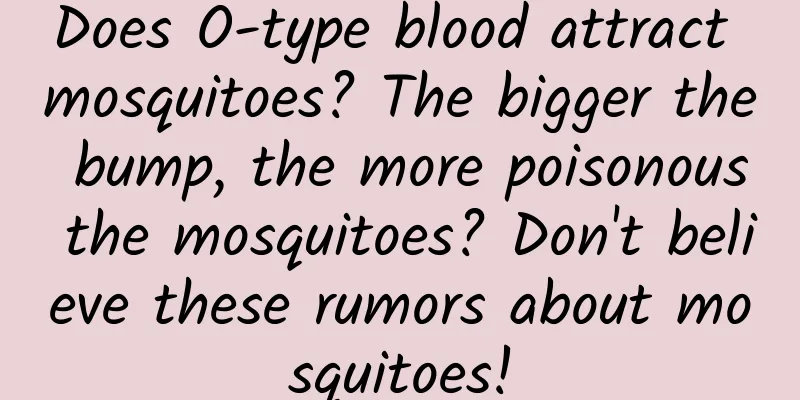Does O-type blood attract mosquitoes? The bigger the bump, the more poisonous the mosquitoes? Don't believe these rumors about mosquitoes!

|
Today is August 20, which is also the annual "World Mosquito Day". Although this holiday is named "Mosquito", it is not established to commemorate mosquitoes, but to raise public awareness of malaria and other mosquito-borne diseases. On this special day, Science Rumors has compiled 7 common rumors about mosquitoes and interpreted them one by one. Do all mosquitoes suck blood? This is not the case. First of all, the "mosquito" we call is actually a general term. Although some insects look like mosquitoes, they are not actually in the Culicidae family, and some do not suck blood. Some species in the Culicidae family, such as the genera Giant mosquito and the genera Colubridae, do not suck blood either. The really annoying and disease-spreading blood-sucking mosquitoes are mainly Aedes, Anopheles, and Culex. Among these three major types of mosquitoes, only female mosquitoes suck blood, because the mouthparts structure of male mosquitoes is different from that of females. They can only suck nectar and plant sap, but not blood. Copyrighted library pictures, unauthorized reproduction Will there be no mosquitoes if you live on a high floor? This statement is too absolute. If we only consider the flying ability, mosquitoes do not fly very high, so it is reasonable to say that living high up helps to encounter fewer mosquitoes. But we must also consider the actual situation, because in many cases mosquitoes do not need to fly all by themselves. For example, the power of the wind alone can bring mosquitoes to an altitude of 160 meters, and mosquitoes can also fly to high floors with elevators, stairs, etc. In addition, sometimes mosquito eggs are also brought into high-rise buildings. At the same time, it is not only the height that affects the distribution of mosquitoes, but also the accumulation of water and temperature. On the whole, there is a trend of decreasing mosquitoes as the floors increase, but if the conditions are suitable, the number of mosquitoes on the middle and high floors may be higher than that on the low floors. Therefore, even if we live in high-rise buildings, we must pay attention to mosquito prevention and control, and avoid accumulation of water so as not to leave room for mosquitoes to breed. Mosquito larvae | Copyrighted image library, no authorization for reproduction The bigger the mosquito bite, the more poisonous the mosquito is? This is not the case. The specific process of mosquitoes sucking blood is: the piercing and sucking mouthparts penetrate the human skin to cause damage. While sucking blood, mosquitoes will also secrete saliva into the human body to prevent blood from clogging the mouthparts, because their saliva contains a variety of chemicals that can inhibit vasoconstriction, blood coagulation and platelet aggregation. These "mosquito saliva" injected into the human body will cause local allergic reactions, causing immune cells to aggregate, and release histamine and a variety of cytokines. These histamine and cytokines will cause vasodilation, increased vascular permeability, local tissue edema, itching and local inflammatory reactions. Everyone's immune system reacts differently, and the reaction to mosquito bites is also different. Therefore, perhaps we should say that the size of the mosquito bite is mainly determined by the physique of the mosquito victim. If there is a red spot on the bite, does it mean it must be caused by a mosquito? This statement is too absolute. In addition to mosquitoes, there are many arthropods that have the habit of sucking blood. They can pierce our skin with their mouthparts to quietly suck blood and leave us with red spots, such as fleas, bedbugs, sandflies, midges, etc. Here I want to talk about midges in particular. They are very small, only a few times the size of mosquitoes, and are often mistaken for "small mosquitoes", but their "small size but more poisonous mouths" are more intense than those of people bitten by mosquitoes. The bumps on the bodies of victims of midges are often more painful and itchy than those of people bitten by mosquitoes. Sometimes friends from the north travel to the south and think that "the mosquitoes here are more poisonous than those in my hometown", but in fact they are often bitten by midges. Copyrighted stock images, no reproduction is authorized Are people with type O blood more likely to attract mosquitoes? There are many rumors online that people with certain blood types are more favored by mosquitoes. In fact, this is a widely circulated misunderstanding. At present, although in a series of studies, different species and populations of mosquitoes have shown a slight preference for blood type, it can only be said that "each has its own preferences" and no blood type has a significant advantage. Overall, the only conclusion that "no matter what blood type, mosquitoes will suck blood" is truly tenable. In fact, people with active metabolism, high body temperature, and more exhaled carbon dioxide are an irresistible temptation for mosquitoes. Are mosquito repellents such as DEET toxic? Don’t use them. This is not true. Substances such as DEET and chlorpyrifos can effectively repel mosquitoes. Adults and older children will not have any problems if they use mosquito repellent containing these ingredients correctly according to the instructions. Specifically, as long as you are careful not to let the mosquito repellent enter your eyes, mouth and nose, there is no need to worry. Therefore, we should not spray the mosquito repellent directly on people. You can first spray the mosquito repellent on your palms and then apply it evenly on the skin with your hands (especially for children). For young babies, it is recommended to use physical protection such as mosquito nets for safety reasons. Can mosquito bites spread HIV? This statement is too sensational. We know that only when a sufficient number of infectious pathogens enter the human body can a person be infected and become ill. Although HIV is notorious, it is not very efficient in spreading itself, and HIV is very fragile. Once it leaves the blood and body fluids, it will quickly lose its infectivity and can no longer infect other people. On the one hand, mosquitoes suck very little blood, and on the other hand, it is the habit of mosquitoes to never spit out the blood in their mouths. Some friends may have questions, can't mosquito bites spread diseases? In fact, diseases such as malaria and dengue fever are transmitted through mosquito saliva, and the corresponding viruses can also reproduce in mosquitoes, while HIV can only be transmitted through blood and cannot increase in number in mosquitoes. Therefore, you don't have to worry about contracting HIV if you are bitten by a mosquito. Review | Meng Fengxia, researcher at the Institute of Infectious Diseases, Chinese Center for Disease Control and Prevention |
<<: You may be drinking these drinks that corrode your teeth every day! (Not just Coke)
>>: Insomnia savior! Can't sleep at night? These tips will help you fall asleep easily
Recommend
Do the shoes you bought really fit?
I want to ask: Do the shoes you bought really fit...
Menstruation with leucorrhea
Leucorrhea is a normal secretion in the female bo...
What is pubic hair itching?
The symptom of pubic hair itching occurs in many ...
What kind of meat is fat beef roll? How to identify the synthetic meat of fat beef roll
Beef rolls are processed beef that is cut into th...
Can I drink motherwort and brown sugar during menstruation?
Is it generally good to drink Yimu brown sugar du...
Laparoscopic fallopian tube surgery
Laparoscopic fallopian tube recanalization is the...
Can I have sex with a uterine cyst?
Uterine cysts are quite harmful and are also a co...
What should I do if I haven't had my period for 41 days?
Many female friends are very worried. What should...
When influenza A strikes, doing this right is more effective than grabbing oseltamivir
Audit expert: Gu Haitong Deputy Chief Physician, ...
Is eye discomfort definitely caused by COVID-19 infection? If you experience these discomforts, you must pay attention~
Many people have found that after being infected ...
What should girls do if they have body odor? These 6 methods work!
Body odor is a disease that everyone is very afra...
How to deal with postpartum body odor?
For a woman, giving birth to a child is the most ...
What to do if a girl has an armpit odor
Armpit odor is very common in our daily life, and...
4 key points for women's special period care
20%-30% of gynecological patients suffer from hor...
Is uterine septate serious?
Nowadays, the incidence of uterine diseases in wo...









